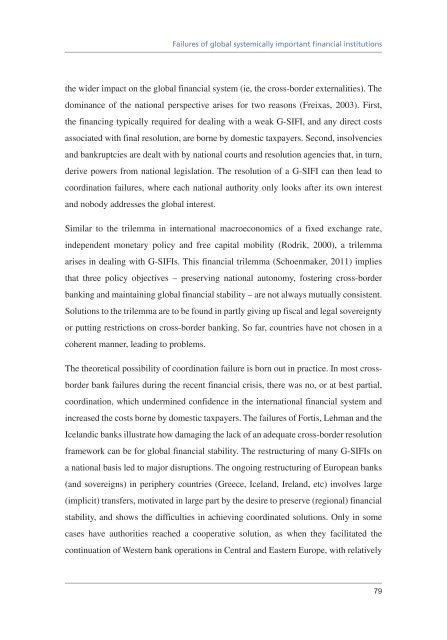Download PDF - Vox
Download PDF - Vox
Download PDF - Vox
- No tags were found...
Create successful ePaper yourself
Turn your PDF publications into a flip-book with our unique Google optimized e-Paper software.
Failures of global systemically important financial institutionsthe wider impact on the global financial system (ie, the cross-border externalities). Thedominance of the national perspective arises for two reasons (Freixas, 2003). First,the financing typically required for dealing with a weak G-SIFI, and any direct costsassociated with final resolution, are borne by domestic taxpayers. Second, insolvenciesand bankruptcies are dealt with by national courts and resolution agencies that, in turn,derive powers from national legislation. The resolution of a G-SIFI can then lead tocoordination failures, where each national authority only looks after its own interestand nobody addresses the global interest.Similar to the trilemma in international macroeconomics of a fixed exchange rate,independent monetary policy and free capital mobility (Rodrik, 2000), a trilemmaarises in dealing with G-SIFIs. This financial trilemma (Schoenmaker, 2011) impliesthat three policy objectives – preserving national autonomy, fostering cross-borderbanking and maintaining global financial stability – are not always mutually consistent.Solutions to the trilemma are to be found in partly giving up fiscal and legal sovereigntyor putting restrictions on cross-border banking. So far, countries have not chosen in acoherent manner, leading to problems.The theoretical possibility of coordination failure is born out in practice. In most crossborderbank failures during the recent financial crisis, there was no, or at best partial,coordination, which undermined confidence in the international financial system andincreased the costs borne by domestic taxpayers. The failures of Fortis, Lehman and theIcelandic banks illustrate how damaging the lack of an adequate cross-border resolutionframework can be for global financial stability. The restructuring of many G-SIFIs ona national basis led to major disruptions. The ongoing restructuring of European banks(and sovereigns) in periphery countries (Greece, Iceland, Ireland, etc) involves large(implicit) transfers, motivated in large part by the desire to preserve (regional) financialstability, and shows the difficulties in achieving coordinated solutions. Only in somecases have authorities reached a cooperative solution, as when they facilitated thecontinuation of Western bank operations in Central and Eastern Europe, with relatively79














